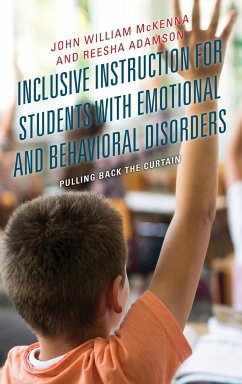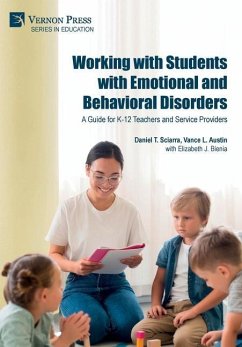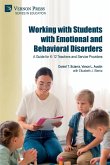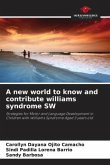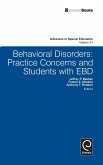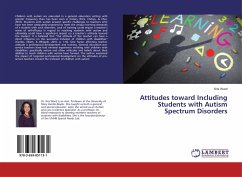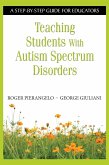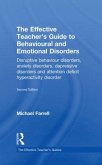Inclusive Instruction for Students with Emotional and Behavioral Disorders
Pulling Back the Curtain
Herausgeber: McKenna, John William; Adamson, Reesha
Schade – dieser Artikel ist leider ausverkauft. Sobald wir wissen, ob und wann der Artikel wieder verfügbar ist, informieren wir Sie an dieser Stelle.
Inclusive Instruction for Students with Emotional and Behavioral Disorders
Pulling Back the Curtain
Herausgeber: McKenna, John William; Adamson, Reesha
- Gebundenes Buch
- Merkliste
- Auf die Merkliste
- Bewerten Bewerten
- Teilen
- Produkt teilen
- Produkterinnerung
- Produkterinnerung
This book is essential reading for stakeholders invested in inclusive instruction for students with emotional disturbance (ED). Research and policy-based recommendations are provided, as are resources for school-based practitioners and parents/guardians alike.
Andere Kunden interessierten sich auch für
![Working with Students with Emotional and Behavioral Disorders Working with Students with Emotional and Behavioral Disorders]() Daniel S SciarraWorking with Students with Emotional and Behavioral Disorders116,99 €
Daniel S SciarraWorking with Students with Emotional and Behavioral Disorders116,99 €![Working with Students with Emotional and Behavioral Disorders Working with Students with Emotional and Behavioral Disorders]() Daniel S. SciarraWorking with Students with Emotional and Behavioral Disorders65,99 €
Daniel S. SciarraWorking with Students with Emotional and Behavioral Disorders65,99 €![A new world to know and contribute williams syndrome SW A new world to know and contribute williams syndrome SW]() Carollyn Dayana Ojito CamachoA new world to know and contribute williams syndrome SW39,99 €
Carollyn Dayana Ojito CamachoA new world to know and contribute williams syndrome SW39,99 €![Behavioral Disorders Behavioral Disorders]() Behavioral Disorders203,99 €
Behavioral Disorders203,99 €![Attitudes toward Including Students with Autism Spectrum Disorders Attitudes toward Including Students with Autism Spectrum Disorders]() Kris WardAttitudes toward Including Students with Autism Spectrum Disorders27,99 €
Kris WardAttitudes toward Including Students with Autism Spectrum Disorders27,99 €![Teaching Students with Autism Spectrum Disorders Teaching Students with Autism Spectrum Disorders]() Roger PierangeloTeaching Students with Autism Spectrum Disorders90,99 €
Roger PierangeloTeaching Students with Autism Spectrum Disorders90,99 €![The Effective Teacher's Guide to Behavioural and Emotional Disorders The Effective Teacher's Guide to Behavioural and Emotional Disorders]() Michael FarrellThe Effective Teacher's Guide to Behavioural and Emotional Disorders172,99 €
Michael FarrellThe Effective Teacher's Guide to Behavioural and Emotional Disorders172,99 €-
-
This book is essential reading for stakeholders invested in inclusive instruction for students with emotional disturbance (ED). Research and policy-based recommendations are provided, as are resources for school-based practitioners and parents/guardians alike.
Produktdetails
- Produktdetails
- Verlag: Globe Pequot Publishing Group Inc/Bloomsbury
- Seitenzahl: 224
- Erscheinungstermin: 5. November 2020
- Englisch
- Abmessung: 235mm x 157mm x 17mm
- Gewicht: 482g
- ISBN-13: 9781498596428
- ISBN-10: 1498596428
- Artikelnr.: 59910962
- Herstellerkennzeichnung
- Libri GmbH
- Europaallee 1
- 36244 Bad Hersfeld
- gpsr@libri.de
- Verlag: Globe Pequot Publishing Group Inc/Bloomsbury
- Seitenzahl: 224
- Erscheinungstermin: 5. November 2020
- Englisch
- Abmessung: 235mm x 157mm x 17mm
- Gewicht: 482g
- ISBN-13: 9781498596428
- ISBN-10: 1498596428
- Artikelnr.: 59910962
- Herstellerkennzeichnung
- Libri GmbH
- Europaallee 1
- 36244 Bad Hersfeld
- gpsr@libri.de
Edited by John William McKenna and Reesha Adamson - Contributions by Reesha Adamson; Eliza Bobek; Maria Kolbe; John William McKenna; Jessica Nelson; Felicity Post and Robai Werunga
Chapter 1: Introduction
Chapter 2: Free Appropriate Public Education: The Foundation of Special
Education
Chapter 3: Practices for Improving Academic Achievement: Lessons Learned
and Limitations of Intervention Research
Chapter 4: Explicit Vocabulary Instruction in the Inclusive Classroom
Chapter 5: Use of Graphic Organizers to Improve Academic Content
Acquisition
Chapter 6: Writing Instructional Strategies for Elementary Age Students
with Emotional and Behavioral Disabilities, by Robai Werunga
Chapter 7: Inclusive Mathematics Practices for Students with Emotional
Disturbance, by Jessica Nelson
Chapter 8: Differentiation of Instructions for Students with Emotional
Disturbance
Chapter 9: Using Technology to Support Inclusive Instruction for Students
with Emotional Disturbance
Chapter 10: Use of Daily Progress Reports and Behavioral Contracts to
Support Inclusive Education
Chapter 11: Function-based Thinking to Support Inclusive Instruction
Chapter 12: Trauma Informed Support: Considerations for Students with ED
Who Have Experienced Trauma, by Felicity Post
Chapter 13: The False Promise of Learning Styles Based Instruction, by John
William McKenna, Reesha Adamson, and Eliza Bobek
Chapter 14: Progress Monitoring in the Inclusive Classroom
Chapter 15: Collaboration in Inclusive Instruction for Students with ED
Chapter 16: Abandoning Readiness, by Maria Kolbe, Inclusion Facilitator
Chapter 17: Closing Commentary
References
About the Authors
About the Contributors
Chapter 2: Free Appropriate Public Education: The Foundation of Special
Education
Chapter 3: Practices for Improving Academic Achievement: Lessons Learned
and Limitations of Intervention Research
Chapter 4: Explicit Vocabulary Instruction in the Inclusive Classroom
Chapter 5: Use of Graphic Organizers to Improve Academic Content
Acquisition
Chapter 6: Writing Instructional Strategies for Elementary Age Students
with Emotional and Behavioral Disabilities, by Robai Werunga
Chapter 7: Inclusive Mathematics Practices for Students with Emotional
Disturbance, by Jessica Nelson
Chapter 8: Differentiation of Instructions for Students with Emotional
Disturbance
Chapter 9: Using Technology to Support Inclusive Instruction for Students
with Emotional Disturbance
Chapter 10: Use of Daily Progress Reports and Behavioral Contracts to
Support Inclusive Education
Chapter 11: Function-based Thinking to Support Inclusive Instruction
Chapter 12: Trauma Informed Support: Considerations for Students with ED
Who Have Experienced Trauma, by Felicity Post
Chapter 13: The False Promise of Learning Styles Based Instruction, by John
William McKenna, Reesha Adamson, and Eliza Bobek
Chapter 14: Progress Monitoring in the Inclusive Classroom
Chapter 15: Collaboration in Inclusive Instruction for Students with ED
Chapter 16: Abandoning Readiness, by Maria Kolbe, Inclusion Facilitator
Chapter 17: Closing Commentary
References
About the Authors
About the Contributors
Chapter 1: Introduction
Chapter 2: Free Appropriate Public Education: The Foundation of Special
Education
Chapter 3: Practices for Improving Academic Achievement: Lessons Learned
and Limitations of Intervention Research
Chapter 4: Explicit Vocabulary Instruction in the Inclusive Classroom
Chapter 5: Use of Graphic Organizers to Improve Academic Content
Acquisition
Chapter 6: Writing Instructional Strategies for Elementary Age Students
with Emotional and Behavioral Disabilities, by Robai Werunga
Chapter 7: Inclusive Mathematics Practices for Students with Emotional
Disturbance, by Jessica Nelson
Chapter 8: Differentiation of Instructions for Students with Emotional
Disturbance
Chapter 9: Using Technology to Support Inclusive Instruction for Students
with Emotional Disturbance
Chapter 10: Use of Daily Progress Reports and Behavioral Contracts to
Support Inclusive Education
Chapter 11: Function-based Thinking to Support Inclusive Instruction
Chapter 12: Trauma Informed Support: Considerations for Students with ED
Who Have Experienced Trauma, by Felicity Post
Chapter 13: The False Promise of Learning Styles Based Instruction, by John
William McKenna, Reesha Adamson, and Eliza Bobek
Chapter 14: Progress Monitoring in the Inclusive Classroom
Chapter 15: Collaboration in Inclusive Instruction for Students with ED
Chapter 16: Abandoning Readiness, by Maria Kolbe, Inclusion Facilitator
Chapter 17: Closing Commentary
References
About the Authors
About the Contributors
Chapter 2: Free Appropriate Public Education: The Foundation of Special
Education
Chapter 3: Practices for Improving Academic Achievement: Lessons Learned
and Limitations of Intervention Research
Chapter 4: Explicit Vocabulary Instruction in the Inclusive Classroom
Chapter 5: Use of Graphic Organizers to Improve Academic Content
Acquisition
Chapter 6: Writing Instructional Strategies for Elementary Age Students
with Emotional and Behavioral Disabilities, by Robai Werunga
Chapter 7: Inclusive Mathematics Practices for Students with Emotional
Disturbance, by Jessica Nelson
Chapter 8: Differentiation of Instructions for Students with Emotional
Disturbance
Chapter 9: Using Technology to Support Inclusive Instruction for Students
with Emotional Disturbance
Chapter 10: Use of Daily Progress Reports and Behavioral Contracts to
Support Inclusive Education
Chapter 11: Function-based Thinking to Support Inclusive Instruction
Chapter 12: Trauma Informed Support: Considerations for Students with ED
Who Have Experienced Trauma, by Felicity Post
Chapter 13: The False Promise of Learning Styles Based Instruction, by John
William McKenna, Reesha Adamson, and Eliza Bobek
Chapter 14: Progress Monitoring in the Inclusive Classroom
Chapter 15: Collaboration in Inclusive Instruction for Students with ED
Chapter 16: Abandoning Readiness, by Maria Kolbe, Inclusion Facilitator
Chapter 17: Closing Commentary
References
About the Authors
About the Contributors

